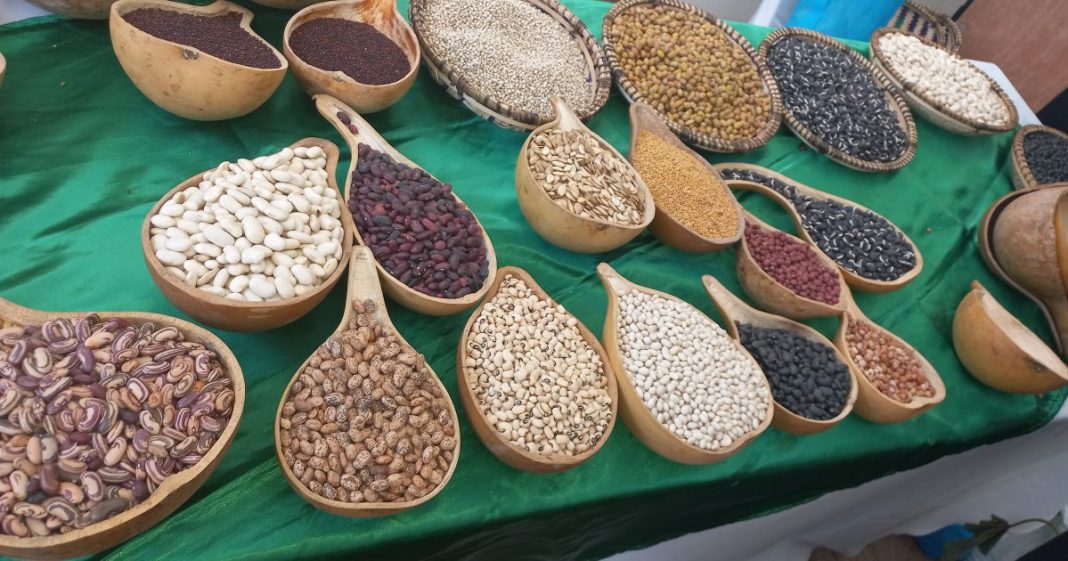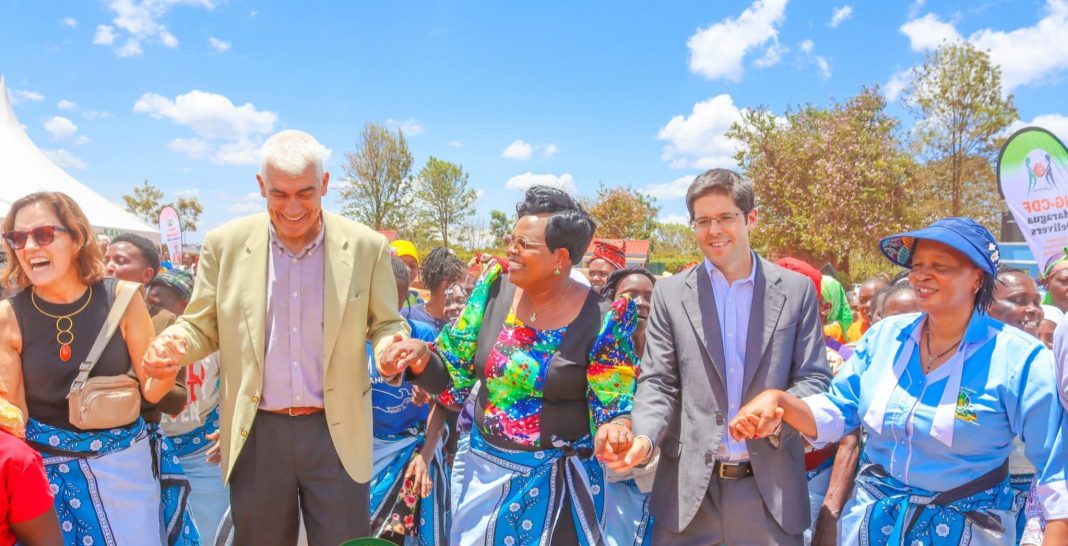Agricultural stakeholders are calling for a complete overhaul of Kenya’s Seed and Plant Varieties Act, Cap 326, which they say undermines the country’s indigenous seed systems and encourages dependence on imported varieties.
The Seed Savers Network, a Kenyan social enterprise promoting agro-biodiversity, has been leading the push to reform the law to reflect the realities of modern agriculture and the rights of smallholder farmers.
Speaking during a stakeholders’ forum in Nakuru, the network’s coordinator, Daniel Wanjama, said the law, enacted in 1972, has become obsolete and fails to address emerging challenges in the sector.
“The current statute discriminates against the participation of a large segment of Kenyans in this vital industry,” Wanjama said.
He explained that while the 2010 National Seed Policy recognized both formal and informal seed systems, this has never been integrated into the law — despite the informal sector supplying nearly 80 percent of Kenya’s seed requirements.
Under the existing law, the sale, exchange, or barter of uncertified or unregistered seeds, including indigenous varieties, is illegal and punishable by up to Ksh1 million in fines or two years in prison.
Wanjama described the penalties as oppressive and counterproductive, arguing that they strip farmers of their traditional right to grow, trade, and share local seeds.
“Freely sharing homegrown seeds will prevent the extinction of our indigenous varieties,” he added, urging the government to fund community-based seed banks and farmer-led initiatives.
He noted that indigenous seeds are not only resilient to pests, diseases, and drought but also culturally significant and better suited to Kenya’s changing climatic conditions.
According to Wanjama, revitalizing indigenous seed systems could create thousands of jobs for youth and women while strengthening food sovereignty and reducing reliance on expensive imported seeds and fertilizers.
He called for the inclusion of a farmer-managed seed system model in the revised Act to ensure quality control, define stakeholder roles, and encourage collaboration between national and county governments, agricultural agencies, and community seed banks.
“We must strengthen both the formal and informal seed systems so they complement, not compete with, each other,” Wanjama emphasized.
Wanjama also highlighted the important role played by women in preserving traditional seeds and ensuring household food security. He urged the government to prioritize indigenous seed bank funding in its annual budget to promote organic farming and lower production costs.
The Genetic Resources Research Institute (GeRRI), based in Muguga, Kiambu County, currently houses over 50,000 plant species in Kenya’s national gene bank. Wanjama suggested expanding its mandate to include partnerships with smallholder farmers and community seed initiatives.
He further warned that climate change is already reshaping Kenya’s agricultural landscape, making indigenous crops increasingly vital in building resilience against drought and food shortages.
“The new law must reflect the realities of Kenyan farmers and align with national and global sustainability goals,” he concluded.







Very nice pattern and fantastic written content, nothing else we need : D.
I gotta favorite this web site it seems very helpful invaluable
online casino australia paypal
References:
https://www.ahrs.al/
online casino uk paypal
References:
myjobsquote.com
Ricky Casino has built a formidable reputation Down Under for
its extensive game library, sourced from over 40 top-tier
software houses. From the nostalgia of 3-reel classics to
the cutting-edge video pokies with all their bells and whistles, punters are spoilt for choice.
With a swag of deposit methods from plastic to digital wallets, they’ve made sure that topping
up your account is as easy as snagging a snag at
a barbie. A network of 98 distinguished software providers, ensuring variety and
quality with heavy-hitters like Microgaming and Evolution Gaming bolstering their ranks.
And if you’re ever in a pickle, their customer service team is as reliable as a mate,
available 24/7 via live chat to sort you out.
A diverse range of payment methods speaks volumes about a site’s commitment to ensuring players
can conduct seamless transactions. We navigate each site like a regular player would to ensure the platforms we recommend offer a
seamless and enjoyable experience. During our review of US gambling
sites, we carry out a hands-on assessment of the user experience.
So, our recommended gaming sites adhere to policies like the CCPA, which indicates a commitment to user
privacy.
Live dealers are games streamed in real-time that you get to play with other players.
We’re talking about roulette, blackjack, baccarat, real money poker, and various card games.
When playing with real money, choose medium or high variance pokies.
References:
https://blackcoin.co/bizzo-casino-australia-review/
All bonuses are available in Australian dollars (AUD), making it easy for local players to participate.
By partnering with such reputable providers, Leon Casino guarantees players access to top-tier games with fair outcomes, cutting-edge graphics,
and immersive gameplay across all categories. NetEnt is famous for its visually stunning
slots and innovative features, while Pragmatic Play offers a broad selection of slots,
live dealer games, and jackpots. Whether you prefer the fast pace of blackjack, the suspense of roulette, or the strategic depth of poker,
Leon Casino’s table game selection delivers quality and choice for every type of player.
Players can also enjoy video poker, craps, and other popular card
games, providing a well-rounded experience beyond just
pokies. With their instant results and interactive features,
crash games add an exciting dimension to the overall gaming experience at
Leon Casino.
Whether you’re waiting for a coffee, relaxing at home, or travelling across Australia,
Leon keeps the full casino experience right in your pocket.
That’s essential in Australia, where online gambling rules encourage safe play
and transparency. Leon provides built-in tools to help you set limits, take breaks, and keep your
gaming experience in check. Of course, it’s not all about
fun — responsible gambling plays a big role here. From AUD-friendly payment options
to responsive customer support, the site has features
that fit into an Australian player’s lifestyle.
Join Leon Casino Australia today – play pokies, bet on sports
and win securely.
Players can use Visa, Mastercard, bank transfers, and popular e-wallets for deposits and withdrawals.
Details of each promotion, including wagering requirements and bonus terms, can be found in the Promotions section. After
verification, you can log in and start playing.
References:
https://blackcoin.co/monte-casino-overview/
Hi there just wanted to give you a quick heads up. The text in your article seem to be running off the screen in Opera. I’m not sure if this is a formatting issue or something to do with internet browser compatibility but I figured I’d post to let you know. The layout look great though! Hope you get the problem fixed soon. Cheers
Ja, Sie können tausende Online Slots in legalen Online-Casinos mit
offizieller GGL-Lizenz spielen. Ja, bei vielen Anbietern können Sie Online Slots kostenlos
spielen. Für Sie bedeutet das, dass Sie nur auf offiziellen Seiten mit GGL-Lizenz sicher und legal spielen können.
Der durchschnittliche Hausvorteil liegt bei Slotspielen um die 4%, das
bedeutet, dass die Spielerinnen und Spieler durchschnittlich 4% ihres Einsatzes pro einzelner Spielrunde verlieren.
In vielen modernen Slotspielen kommen bereits einige innovative Spielelemente
vor, wie beispielsweise Cluster-Auszahlungen, bei denen Gewinnkombinationen durch aneinandergrenzende Symbolcluster entstehen, oder
auch viele andere erfinderische Features. Normalerweise bestehen Online Slotspiele aus einer bestimmten Anzahl von Walzen, auf denen die unterschiedlichsten Symbole
getroffen werden können.
References:
https://online-spielhallen.de/snatch-casino-mobile-app-dein-spielvergnugen-fur-unterwegs/
https://t.me/Official_1xbet_1xbet/s/420
https://t.me/Official_1xbet_1xbet/s/1469
The way you write feels personal and authentic.
Thanks for making this easy to understand even without a background in it.
https://t.me/Online_1_xbet/2891
https://t.me/Online_1_xbet/3551
https://t.me/Online_1_xbet/1847
купить старый диплом техникума купить старый диплом техникума .
https://t.me/Online_1_xbet/3371
https://t.me/Online_1_xbet/3538
This is exactly the kind of content I’ve been searching for.
Thanks for addressing this topic—it’s so important.
https://t.me/Online_1_xbet/2198
https://t.me/Online_1_xbet/1893
https://t.me/Online_1_xbet/2619
купить дипломы о высшем цены https://rudik-diplom2.ru – купить дипломы о высшем цены .
When someone writes an paragraph he/she keeps the idea of a user in his/her mind that how a user can be aware of it. Therefore that’s why this paragraph is amazing. Thanks!
https://t.me/Online_1_xbet/2668
мостбет авиатор
Hey, schon, dass du hier bist. Wir wissen, wie viel kleine Rituale bedeuten – der Duft nach der Dusche, das Gefuhl frischer Haut, ein Moment nur fur dich. https://das-wild.de/ macht diese Momente echter. Mit nachfullbaren Deos, Duschgels und Lippenbalsamen, die gut riechen, lange halten und auf Plastik verzichten. Es geht nicht um Verzicht, sondern um das gute Gefuhl, etwas Richtiges zu tun – fur dich und fur alles, was dich umgibt.
https://t.me/Online_1_xbet/2623
Such a refreshing take on a common topic.
https://t.me/Online_1_xbet/2362
https://zencaremeds.com/# ZenCare Meds com
https://t.me/Online_1_xbet/1895
https://t.me/Online_1_xbet/2645
https://t.me/Online_1_xbet/3007
Excellent work! Looking forward to future posts.
https://t.me/Online_1_xbet/2252
https://t.me/Online_1_xbet/2729
https://t.me/Online_1_xbet/3100
I like how you presented both sides of the argument fairly.
https://domebeli.ru/ofis/vannaya-v-russkom-stile
https://t.me/Online_1_xbet/2396
https://t.me/Online_1_xbet/3093
https://t.me/Online_1_xbet/2196
Thank you for covering this so thoroughly. It helped me a lot.
https://t.me/Online_1_xbet/2560
This was a very informative post. I appreciate the time you took to write it.